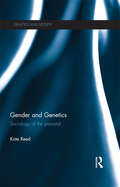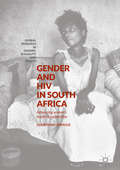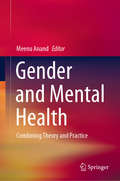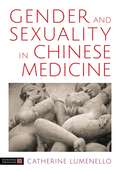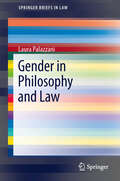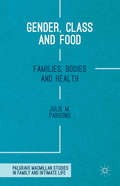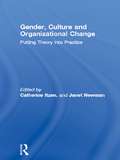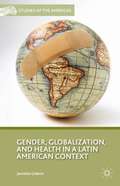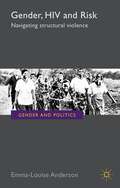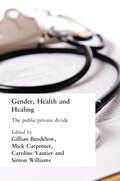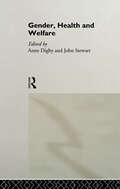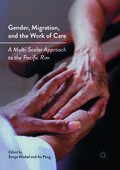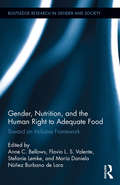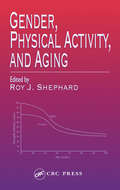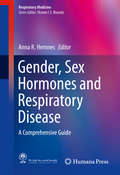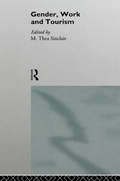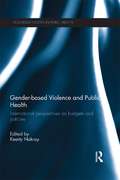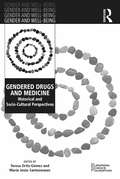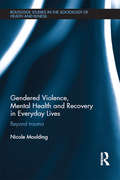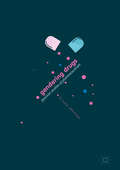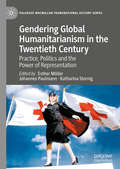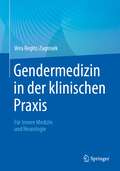- Table View
- List View
Gender and Genetics: Sociology of the Prenatal (Genetics and Society)
by Kate ReedPrenatal screening for genetic disorders is becoming an increasingly widespread phenomenon across the globe. While studies have highlighted the importance of women’s experiences of such screening, little is known about men’s roles and direct involvement in this process. With a focus on the experiences of both women and men, this text offers an innovative and passionate account of the gendered nature of prenatal screening. Drawing on interview data with pregnant women and their male partners in a UK city, Reed provides a compelling analysis of maternal and paternal roles in prenatal screening. Through this analysis, the book raises important issues around genetics, gender and screening practice. With a focus on the gendered production of ‘good’ and ‘bad’ genes, the book explores differences between visual technologies and blood screening. It also explores the gendered nature of genetic responsibility and the impact this has on parenting roles. Extending its arguments into other key debates in prenatal genetics – including a focus on the impact of screening on other types of stratification, including ethnicity and class – Reed provides an original and comprehensive analysis of some of the most pressing concerns in the field to date. This book will be of interest to students and scholars of the sociology of health and illness, science and technology studies, gender studies, feminist bioethics and medical anthropology, as well as professionals in the fields of midwifery and genetic counselling.
Gender and HIV in South Africa: Advancing Women's Health And Capabilities (Global Research In Gender, Sexuality And Health Ser.)
by Courtenay SpragueThis book addresses the ongoing problem of HIV in black South African women as a health inequity. Importantly, it argues that this urgent problem of justice is changeable. Sprague uses the capabilities approach to bring a theory of health justice, together with multiple sources of evidence, to investigate the complex problem of HIV and accompanying poor health outcomes in black South African women. Motivated by a concern for application of knowledge, this work discusses how to better conceptualise what health justice demands of state and society, and how to mobilise available evidence on health inequities in ways that compel greater state action to address problems of gender and health. HIV in women, and possible responses, are investigated on four distinct levels: conceptual, social structure, health systems, and law. The analysis demonstrates that this problem is indeed modifiable with long-term interventions and an enhanced state response targeted at multiple levels. This book will be of interest to academics and students in the social health sciences, gender and development studies, and global health, as well as HIV/health activists, government officials, policy makers, HIV clinicians and health providers interested in HIV.
Gender and Mental Health: Combining Theory and Practice
by Meenu AnandThis book focuses on various aspects of gender and mental health. Drawing on multidisciplinary perspectives and scholarship, it summarizes the complex intertwining of illness and culture in the context of the rising frequency of mental disorders. The book is divided into three sections, the first of which examines the fundamental and conceptual underpinnings of mental health, well-being and wellness from a gender perspective, in order to present an overview of mental health through a holistic gender lens. The second section focuses on the mental health scenario in India, examining the epidemiological data and etiology of mental illness from a psychosocial standpoint. Lastly, the third section shares field-based narratives that reflect the multifaceted challenges related to the treatment of mental illness, inclusion and the promotion of positive mental health. It also includes success stories in diverse settings. The book is an indispensable read for scholars and professionals in psychology, sociology, gender studies and social work.
Gender and Sexuality in Chinese Medicine: The Merging Of Yin And Yang
by Catherine J. LumenelloThis progressive handbook for Chinese medicine students and practitioners looks at gender, physiology, relationships and sexual attraction from the Chinese medicine perspective. Many standard diagnostic and treatment techniques are gender-based and do not work with clients who identify as LGBT or gender/sex/relationship fluid and so these communities are currently often underserved.Catherine Lumenello accesses the Daoist, Buddhist and Confucianist roots of the medicine and explores the energetic pathways, the Three Treasures and other theories in order to understand the emotional etiology and treatment concerns prevalent within these client groups. The topics covered in the book include transgender issues, asexuality, sex addiction, sexual realignment surgery and polyamory. Incorporating client examples, illustrations, and an assortment of treatment approaches, this book is a radical re-examination of the potential of Chinese medicine.
Gender in Philosophy and Law
by Laura PalazzaniThis book is an introductory systematic framework in the complex and interdisciplinary sex/gender debate, focusing on philosophy of law.The volume analyses the different theories that have dealt with the gender category, highlighting the conceptual premises and the arguments of the most influential theories in the debate, which have had repercussions on the field of the ethical and juridical debate (with reference to intersexuality, transsexualism, transgender, homosexuality). The aim is to offer a sort of conceptual orientation in the complexity of the debate, in an effort to identify the various aspects and development processes of the theories, so as to highlight the conceptual elements of the theorisations to grasp the problem areas within them. It is therefore an overall synthetic and also explicative analysis, but not only explicative: the aim is to outline the arguments supporting the different theories and the counter-arguments too, for the purpose of proposing categories to weigh up the elements and to take one's own critical stance, with a methodological style that is neither descriptive nor prescriptive, but critical.
Gender, Class and Food: Families, Bodies and Health (Palgrave Macmillan Studies in Family and Intimate Life)
by Julie M. ParsonsEveryday foodways are a powerful means of drawing boundaries between social groups and defining who we are and where we belong. This book draws upon auto/biographical food narratives and emphasises the power of everyday foodways in maintaining and reinforcing social divisions along the lines of gender and class.
Gender, Culture and Organizational Change: Putting Theory into Practice
by Janet Newman Catherine ItzinAn engaging contribution to the increasing body of knowledge about gender and organizations, Gender, Culture and Organizational Change examines gender-based inequality in organizations and considers how sexual and social relations between women and men based on sexuality, power and control determine the cultures, structures and practices of organization and the experiences of men and women working in them. Gender, Culture and Organizational Change represents a decade of experience of managing change and implementing theory in public sector organizations during a period of major social, political and economic transition and analyses the progress that has been made. It expands to make wider connections with women and trade unions in Europe and management development for women in the "developing" countries of Africa and Asia. It will be valuable reading for students in social policy, gender studies and sociology and for professionals with an interest in understanding the dynamics of the workplace.
Gender, Globalization, And Health In A Latin American Context
by Jasmine GideonUsing a political economy of health, this book examines the linkages between gender, globalization, and health in a Latin American context.
Gender, HIV and Risk
by Emma-Louise AndersonThis book examines the gender context of HIV and critiques the global policy response. Anderson contributes to the feminist task of de-invisibilising gender as structural violence and identifies how gendered power structures are responded to at the local level in Malawi.
Gender, Health and Healing: The Public/Private Divide
by Gillian Bendelow, Mick Carpenter, Caroline Vautier and Simon WilliamsWhat do we mean by 'gender' and how does this relate to health?How is 'biology' best understood?What does a focus on the division of labour bring to our understanding of health work?Is (gender) 'equity' in health possible?How have developments such as the resurgence of emotions and the new genetics affected these and other social relations at the turn of the century?These are just some of the questions addressed in Gender, Health and Healing in which a whole range of issues are brought together and connected to emerging concerns in contemporary life such as the new genetics and transformations in biomedical knowledge and practices. It offers a challenging assessment of gender relations and embodied practices across the public/private divide, using health and healing as paradigmatic examples.This thought-provoking volume lies at the intersection of gender studies, the sociology of health and healing, health policy, the critical analysis of scientific knowledge and the current debates around the body, health and emotions. Bringing together new and leading scholars in the field, it provides a unique critical overview of contemporary debates in health care for an interdisciplinary readership.
Gender, Health and Welfare
by Anne Digby John StewartGender, Health and Welfare deals primarily with the century before the creation of the classic welfare state in Britain. It provides a stimulating introduction to an historical era which saw a huge expansion in welfare services, both state and voluntary, and during which women emerged as significant 'consumers' and 'providers' of various measures.
Gender, Migration, and the Work of Care
by Sonya Michel Ito PengThis book explores how around the world, women's increased presence in the labor force has reorganized the division of labor in households, affecting different regions depending on their cultures, economies, and politics; as well as the nature and size of their welfare states and the gendering of employment opportunities. As one result, the authors find, women are increasingly migrating from the global south to become care workers in the global north. This volume focuses on changing patterns of family and gender relations, migration, and care work in the countries surrounding the Pacific Rim--a global epicenter of transnational care migration. Using a multi-scalar approach that addresses micro, meso, and macro levels, chapters examine three domains: care provisioning, the supply of and demand for care work, and the shaping and framing of care. The analysis reveals that multiple forms of global inequalities are now playing out in the most intimate of spaces.
Gender, Nutrition, and the Human Right to Adequate Food: Toward an Inclusive Framework (Routledge Research in Gender and Society)
by Anne C. Bellows Flavio L. S. Valente Stefanie Lemke María Daniela Núñez Burbano de LaraThis book introduces the human right to adequate food and nutrition as evolving concept and identifies two structural "disconnects" fueling food insecurity for a billion people, and disproportionally affecting women, children, and rural food producers: the separation of women’s rights from their right to adequate food and nutrition, and the fragmented attention to food as commodity and the medicalization of nutritional health. Three conditions arising from these disconnects are discussed: structural violence and discrimination frustrating the realization of women’s human rights, as well as their private and public contributions to food and nutrition security for all; many women’s experience of their and their children’s simultaneously independent and intertwined subjectivities during pregnancy and breastfeeding being poorly understood in human rights law and abused by poorly-regulated food and nutrition industry marketing practices; and the neoliberal economic system’s interference both with the autonomy and self-determination of women and their communities and with the strengthening of sustainable diets based on democratically governed local food systems. The book calls for a social movement-led reconceptualization of the right to adequate food toward incorporating gender, women’s rights, and nutrition, based on the food sovereignty framework.
Gender, Physical Activity, and Aging
by Roy J. ShephardWhy do women live longer than men? Does ownership of paired X chromosomes confer more prolonged survival on females, or is the gender difference in life-expectancy a cumulative consequence of differing life experiences for women and men? The areas of gender differences in aging, functional capacity, and the response to physical activity have often
Gender, Sex Hormones and Respiratory Disease
by Anna R. HemnesThis book discusses normal sex-related differences in lung structure and function and the role these differences play in lung disease. New research on the effects of sex hormone signaling on specific cell types of the lung has begun to reveal how these hormones may drive or prevent lung disease. Expertly written chapters examine the effects of sex hormones on normal pulmonary structure and function, hormone signaling in lung health, and specific diseases such as chronic obstructive pulmonary disease, asthma, pulmonary hypertension, and lung cancer. Gender, Sex Hormones, and Respiratory Disease: A Comprehensive Guide focuses on our current understanding and the gaps in research, with suggestions for future directions and implications for therapy. This book is a useful reference for pulmonologists and researchers and will prompt further inquiry aimed at improving overall lung health.
Gender, Sexuality, and Syphilis in Early Modern Venice
by Laura J. McgoughA unique study of how syphilis, better known as the French disease in the sixteenth and seventeenth centuries, became so widespread and embedded in the society, culture and institutions of early modern Venice due to the pattern of sexual relations that developed from restrictive marital customs, widespread migration and male privilege.
Gender, Work and Tourism
by M. Thea SinclairGender, Work and Tourism examines the central role played by women in the tourism industry. It discusses the nature of their work and the ways in which tourism creates tensions between the attitude and conduct of tourists and the beliefs and behaviour of local women. Among the areas explored are: the segmentation of tourism work in Northern Cyprus; women's and men's work in Bali and the division of social and political power; gendered tourism work in Mexico and the Philippines; material and ideological changes in sex tourism in South-East Asia and the exploitation of South-East Asian women in Japan.
Gender-Based Violence: A Comprehensive Guide
by Parveen Ali Michaela M. RogersThis book provides comprehensive information about various types of gender-based violence (GBV) and abuse. GBV is a major public health and social problem that affects people, mostly women and girls, in every community, culture, and country. GBV refers to the violence or a pattern of abusive behaviours including physical aggression, sexual coercion, psychological abuse and controlling behaviours resulting in physical, sexual or psychological harm. It is associated with severe physical and psychological consequences, and can result in death. . GBV can take many forms including female foeticide, infanticide, female genital mutilation, child marriage, grooming, trafficking, forced marriage, dowry- related abuse, honour-based violence, rape, sexual assault, stalking, harassment, street violence, abuse against older people, domestic violence, and intimate partner violence. It can take place in public, private and virtual settings, and within the context of intimate, familial, community and institutional relationships. While all these forms affect girls and women more, boys and men can also be exposed of various forms of violence including child abuse, sexual abuse, wartime violence, corporal punishment to name a few. This book takes a unique approach and presents an overview of gender-based violence and related practices throughout the world. The book is written in a user friendly manner in order to be accessible as an introductory text to a wide range of readers including students, practitioners and researchers. Edited by a public health academic and a social worker, with contributions representing a wide range of disciplines, the book will appeal to many professions including nurses, midwives, social care and social work practitioners, police, teachers, psychologists, and sociologists.
Gender-based Violence and Public Health: International perspectives on budgets and policies
by Keerty NakrayGender-based violence is a multi-faceted public health problem with numerous consequences for an individual’s physical and mental health and wellbeing. This collection develops a comprehensive public health approach for working with gender-based violence, paying specific attention to international budgets, policies and practice and drawing on a wide selection of empirical studies. Divided into two parts, the text looks at how public health budgets and policies can be used to influence a range of risk factors and outcomes, and then outlines a theoretical and conceptual framework. The second section draws on empirical studies to illustrate ways of managing the risks and impacts of, and responses to, the problem. It concludes by summarising those risk factors that can be effectively addressed through appropriately budgeted public health programmes globally. Highlighting ways of bolstering protective and resilience factors and identifying early interventions, it demonstrates the importance of inter-agency interventions through coordinated effort from a wide range of sectors including social services, education, religious organisations, judiciary, police, media and business. This inter-disciplinary volume will interest students and researchers working on gender-based violence, gender budgeting and public health policy from a range of backgrounds, including public health, sociology, social work, public policy, gender studies, development studies and economics.
Gendered Drugs and Medicine: Historical and Socio-Cultural Perspectives (Gender and Well-Being)
by María Jesús Santesmases Teresa Ortiz-GomezDrugs are considered to be healers and harmers, wonder substances and knowledge makers; objects that impact on social hierarchies, health practices and public policies. As a collective endeavour, this book focuses on the ways that gender, along with race/ethnicity and class, influence the design, standardisation and circulation of drugs throughout several highly medicalised countries throughout the twentieth century and until the twenty-first. Fourteen authors from different European and non-European countries analyse the extent to which the dominant ideas and values surrounding masculinity and femininity have contributed to shape the research, prescription and use of drugs by women and men within particular social and cultural contexts. New and lesser-known, gender-specific issues in lifestyles and social practices associated with pharmaceutical technologies are analysed, as is the manner in which they intervene in life experiences such as reproduction, sexual desire, childbirth, depression and happiness. The processes of prescribing, selling, marketing and accepting or forbidding drugs is also examined, as is the contribution of gendered medical practices to the medicalisation and growing consumption of drugs by women. Gender relations and other hierarchies are involved as both causes and consequences of drug cultures, and of the history and social life of gender in contemporary drug production, use and consumption. A network of agents emerges from this book’s research, contributing to a better understanding of both gender and drugs within our society.
Gendered Moods: Psychotropics and Society
by Elizabeth Ettorre Elianne RiskaTranquillisers are prescribed to almost twice as many women as men, yet very little gender-based research has been carried out on the social context of their use. Gendered Moods offers the first feminist analysis of the gendered character of psychotropic drug use, based on studies of long-term psychotropic drug users and the content of drug advertising. The authors argue that gender differences in psychotropic drug use are manifestations of the gendered construction of society as a whole, and that, as a result, women are particularly susceptible to being channelled into a state of dependency on prescribed drugs. Exploring current social scientific debates relating to drug users and providers, Gendered Moods also provides a critical review of previous research. It is a much needed introduction to a neglected area of study.
Gendered Violence, Abuse and Mental Health in Everyday Lives: Beyond Trauma
by Nicole MouldingGendered Violence, Abuse and Mental Health in Everyday Lives: Beyond Trauma offers new insights into the social dimensions of emotional distress in abuse-related mental health problems, and explores the many interconnections between gendered violence, different forms of abuse and poor mental health. Looking at how individuals can overcome the impact of abuse over the course of their lives, Moulding maps a feminist-informed recovery-oriented approaches to therapy and prevention. Drawing on sociological perspectives and a wide range of international research, as well as original qualitative data presented here for the first time, this book: -Demonstrates how gender and other social power relations play out in the specific emotional dimensions of some of the mental health problems most strongly linked to abuse, including post-traumatic stress disorder, anxiety, depression and eating disorders; -Critiques the way that mainstream psychological theory and research pathologises the effects of abuse through various mental illness diagnoses, obscuring the nature of the individual emotional distress involved, its social context and relational nature; -Outlines a feminist-informed, recovery-oriented approach that aims to reduce violence against women and children. This innovative volume is an important contribution to the literature on the impact of violence and abuse on the lives and health of its survivors. It will be of interest to students and researchers from a range of disciplines and professions, including social work, gender studies, sociology, social policy, psychology, counselling, mental health, public health, medicine and nursing.
Gendering Drugs: Feminist Studies of Pharmaceuticals
by Ericka JohnsonThis book, by bringing together critical pharmaceutical studies and feminist technoscience studies, explores the way drugs produce sexed and/or gendered identities for those who take – or resist – them, and how feminist technoscience studies can contribute a theoretical lens with which to observe sex and gender in the pharmaceuticalization processes. Topics explored in this diverse collection include the use of hormones to delay puberty onset for trans children; HPV vaccination against cervical cancer in Sweden, the UK, Austria and Colombia; Alzheimer’s discourses; and the medication of prostate issues. Ericka Johnson has brought together an innovative and timely collection that demonstrates gender as relevant in studies of pharmaceuticals, and provides multiple examples of methodological and theoretical tools to consider gender while studying drugs.
Gendering Global Humanitarianism in the Twentieth Century: Practice, Politics and the Power of Representation (Palgrave Macmillan Transnational History Series)
by Johannes Paulmann Esther Möller Katharina Stornig“This volume is interesting both because of its global focus, and its chronology up to the present, it covers a good century of changes. It will help define the field of gender studies of humanitarianism, and its relevance for understanding the history of nation-building, and a political history that goes beyond nations.” - Glenda Sluga, Professor of International History and ARC Kathleen Laureate Fellow at the University of Sydney, AustraliaThis volume discusses the relationship between gender and humanitarian discourses and practices in the twentieth century. It analyses the ways in which constructions, norms and ideologies of gender both shaped and were shaped in global humanitarian contexts. The individual chapters present issues such as post-genocide relief and rehabilitation, humanitarian careers and subjectivities, medical assistance, community aid, child welfare and child soldiering. They give prominence to the beneficiaries of aid and their use of humanitarian resources, organizations and structures by investigating the effects of humanitarian activities on gender relations in the respective societies. Approaching humanitarianism as a global phenomenon, the volume considers actors and theoretical positions from the global North and South (from Europe to the Middle East, Sub-Saharan Africa, South and South East Asia as well as North America). It combines state and non-state humanitarian initiatives and scrutinizes their gendered dimension on local, regional, national and global scales. Focusing on the time between the late nineteenth century and the post-Cold War era, the volume concentrates on a period that not only witnessed a major expansion of humanitarian action worldwide but also saw fundamental changes in gender relations and the gradual emergence of gender-sensitive policies in humanitarian organizations in many Western and non-Western settings.
Gendermedizin in der klinischen Praxis: Für Innere Medizin und Neurologie
by Vera Regitz-ZagrosekDas Buch ist ein praxisorientiertes Nachschlagewerk für alle Ärztinnen und Ärzte, die die komplizierten Zusammenhänge zwischen Geschlecht und Gesundheit verstehen wollen. Geschlechtsspezifische Konzepte werden für die Innere Medizin und die Neurologie praxisrelevant aufbereitet – als Information für Kliniker*innen in den internistischen Disziplinen und der Neurologie, daneben auch für Spezialist*innen, die sich mit Pharmakotherapie, Pathophysiologie und Genomik befassen. Die einzelnen Gebiete werden systematisch im Hinblick auf geschlechtsspezifische Unterschiede in Prävention, Klinik, Diagnose, interventioneller und pharmakologischer Therapie dargestellt.
